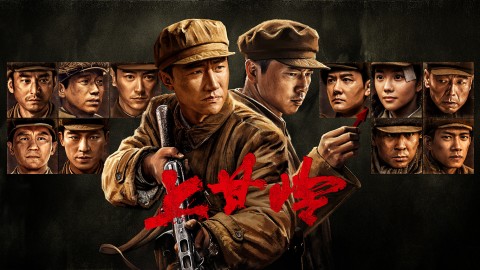Episode 11 recap: Ye Wenjie refused to sign.
Ye Wenjie recalled the scene, where the room was quiet, and the sound of a pen scratching could be heard. She could also smell the scent of sawdust. Since her father's death, she hadn't experienced that relaxed and warm feeling for a long time.After finishing writing the document, Ye Wenjie quickly handed it over to Bai Mu Lin. Their hands accidentally touched each other, and Ye Wenjie quickly withdrew as if startled. She then ran to the side and picked up Bai Mu Lin's clothes, intending to wash them and return them. However, Bai Mu Lin kindly declined and urged Ye Wenjie to go home and rest.
Before leaving, Bai Mu Lin told Ye Wenjie that he was planning to report the situation to higher authorities and have her transferred back to her original position. But Ye Wenjie had no intention of leaving, which made Bai Mu Lin realize that she had something difficult to express. After that, Ye Wenjie repeated her work day after day, and in her spare time, she would gaze into the distance, lost in thought.
Soon, bad news came from outside, and Ye Wenjie received a notification to return urgently. She quickly met with Zhang Zhu Ren from the political department. He promptly took out the denunciation letter that Ye Wenjie had written before and insisted that upon comparison, the handwriting on it matched hers. Ye Wenjie explained that she had transcribed it for someone else, but Zhang Zhu Ren quickly guessed that she was referring to journalist Bai Mu Lin, who immediately appeared before them. He vehemently accused Ye Wenjie of being the mastermind behind the crime.
At this moment, Ye Wenjie stood in front of Bai Mu Lin. She couldn't believe that the once gentle and refined young man could have such a deceptive demeanor. Now, no one believed anything Ye Wenjie said. Zhang Zhu Ren angrily turned and left, instructing Ye Wenjie to stay in that place and reflect on her erroneous thoughts.
Bai Mu Lin followed the others and walked out, leaving Ye Wenjie standing still in place. She clenched her teeth in frustration, her eyes filled with tears. Afterward, Ye Wenjie was locked alone in a cold and dim room, where she shivered from the cold, and nobody cared about her. Soon, Cheng Li Hua, a representative from the Intermediate Court Military Control, entered the room and encountered the trembling Ye Wenjie. Cheng Li Hua didn't expect someone so young to take the wrong path, but she treated Ye Wenjie without discrimination. Cheng Li Hua friendly extended her hand to greet Ye Wenjie, but upon touching Ye Wenjie's hand, she realized how cold it was. They both sat down, and Cheng Li Hua sighed for Ye Wenjie's young age and the mistakes she had made. She shared that young people also make mistakes, and she had her own firsthand experience. As long as one recognizes their mistakes and corrects them, they can still find the right path.
Outside, under Cheng Li Hua's orders, someone brought in a warm stove, and Cheng Li Hua personally poured a cup of hot tea for Ye Wenjie and handed it to her. However, Ye Wenjie had no intention of drinking the hot tea. She sat motionless in her chair. Cheng Li Hua then brought out a document for Ye Wenjie to sign and informed her that signing it would prove her attitude and stance. After hearing this, Ye Wenjie still had no intention of picking up the pen. Cheng Li Hua tried to persuade her to trust the organization, but Ye Wenjie had no idea what was going on, so she refused to sign. Cheng Li Hua explained the true situation to Ye Wenjie, saying that there was hope for a resolution. If Ye Wenjie could recognize her own problem, it wouldn't be a big deal for a young intellectual who had been misled by reactionary books. They wouldn't have to go through the judicial process; she could attend a study class and write a few self-criticisms, and then she could continue working at the forest farm.
Cheng Li Hua turned to Ye Wenjie again and told her that if she persisted in stubbornness, she might face strict punishment and would have to accept education. Any lofty ideas would come crashing down when faced with the heavy gravity of reality. At that moment, Ye Wenjie silently stared at Cheng Li Hua in front of her, resolutely following her own heart and not mentioning the matter of signing.
After hearing Ye Wenjie's past experiences, Wang Miao didn't expect her to have gone through so much. Ye Wenjie also had a calm attitude, feeling that everything was in the past. She understood Bai Mu Lin's actions at that time, considering the oppressive environment he faced.
In that quiet spring, the question of right and wrong occupied Ye Wenjie's thoughts the most. From the perspective of humans, using pesticides seemed perfectly reasonable and normal. However, when viewed from the perspective of nature, humans caused many harms to the world. After that incident, Ye Wenjie left the northern forest farm, and this experience made her understand many truths all at once.



This episode highly faithful to the original work, just like reading the original novel. However, they omitted the last scene where, after Ye Wenjie refused to sign the document, the woman named Cheng, in a fit of rage, poured a bucket of cold water over Ye Wenjie, nearly freezing her to death.
The TV series removed this scene, possibly because they felt it was too cruel and dark, fearing it would have a negative impact. But in reality, it would have been better to keep that scene.
It is a crucial and even the most important part.
I don't think Bai Mulin is the turning point where Ye Wenjie finally made up her mind. The real turning point was the situation at that time. Like her father, she also experienced criticism and betrayal from loved ones.
It was so despairing, unable to find a way out. If there was a possible "ray of light" at that moment, she would be determined to seize the opportunity.
Ye Wenjie is the most influential character in "The Three-Body Problem." She endured so much suffering in her youth. Instead of seeking revenge against specific individuals, she reflected on the world as a whole.
This led her to contemplate exploiting the weaknesses of human nature in order to bring about its destruction. When she ignited that fire but lost control, she left behind the Black Forest as a means of self-preservation for humanity before her passing.
The revelation of Bai's true identity wasn't the direct reason for her determination to respond to the Trisolarans. Prior to that, her father's murder, the subsequent persecution by Cheng representing the government, and the deceit by Commissioner Lei had repeatedly plunged Ye Wenjie into despair about the human world.
In the end, it was these moments of despair that resolutely led her to press the button of destiny.
Don't just talk about Ye Wenjie. Right now, there are definitely a majority of viewers who want to press the fast-forward button.
The adaptation "amplified" certain events from Ye Wenjie's youth. In the original book, there was no mention of Ye Wenjie helping Bai Mu Lin with laundry, and Bai Mu Lin was not present when Ye Wenjie was falsely accused.
It was a spontaneous decision by Bai Mu Lin when she was being "persecuted" to shift the blame onto Ye Wenjie. The TV series strengthened the emotional expression between Ye Wenjie and Bai Mu Lin, as well as intensified the level of persecution Bai inflicted upon Ye, further highlighting the injustices Ye Wenjie faced in her youth and laying the groundwork for her actions in the future.
Are you sure you've read the original novel? In the original novel, there is a scene where Ye Wenjie helps Bai Mu Lin with the laundry. At that time, Ye Wenjie felt a long-lost sense of peace and warmth when they were together, so she unconsciously uttered those words.
All I can say is that she unfortunately encountered someone like Bai, a scum who thought he was a driving force for progress but turned out to be the beginning of disillusionment. So, whatever this love thing is, in real life, there are more cruel people.
The real truth is to live well and face reality.
The four characters "Revolutionary Masses" were written in imitation of Ye Wenjie's handwriting. If I remember correctly, the original work also mentioned it. At least Bai had a hidden agenda and wasn't as straightforward as you might think.